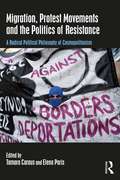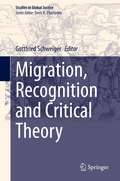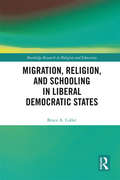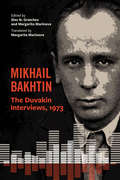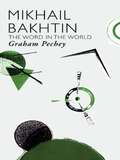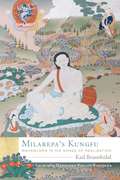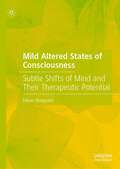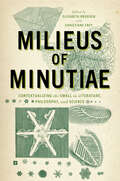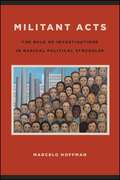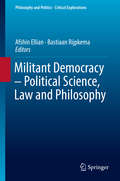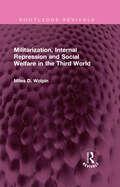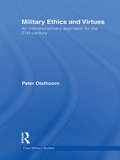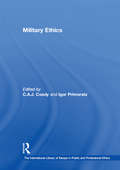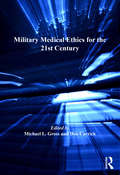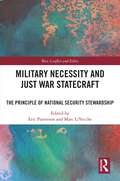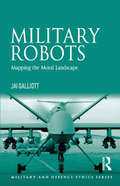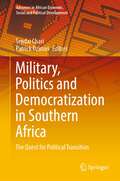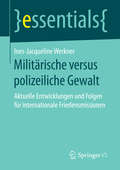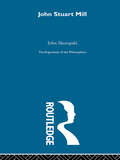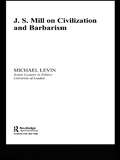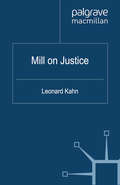- Table View
- List View
Migration, Protest Movements and the Politics of Resistance: A Radical Political Philosophy of Cosmopolitanism
by Tamara Caraus Elena ParisMigration and cosmopolitanism are said to be complementary. Cosmopolitanism means to be a citizen of the world, and migration, without impediments, should be the natural starting point for a cosmopolitan view. However, the intensification of migration, through an increasing number of refugees and economic migrants, has generated anti-cosmopolitan stances. Using the concept of cosmopolitanism as it emerges from migrant protests like Sans Papiers, No One Is Illegal, and No Borders, an interdisciplinary group of scholars addresses this discrepancy and explores how migrant protest movements elicit a new form of radical cosmopolitanism. The combination of basic theoretical concepts and detailed empirical analysis in this book will advance the theoretical debate on the inherent cosmopolitan aspects of migrant activism. As such, it will be a valuable contribution to students, researchers and scholars of political science, sociology and philosophy.
Migration, Recognition and Critical Theory (Studies in Global Justice #21)
by Gottfried SchweigerThis book brings together philosophical, social-theoretical and empirically oriented contributions on the philosophical and socio-theoretical debate on migration and integration, using the instruments of recognition as a normative and social-scientific category. Furthermore, the theoretical and practical implications of recognition theory are reflected through the case of migration. Migration movements, refugees and the associated tensions are phenomena that have become the focus of scientific, political and public debate in recent years. Migrants, in particular refugees, face many injustices and are especially vulnerable, but the right-wing political discourse presents them as threats to social order and stability. This book shows what a critical theory of recognition can contribute to the debate. The book is suitable for researchers in philosophy, social theory and migration research. "A profound examination of how states and societies struggle to recognize migrants as fellow human beings in all their fullness. The contributions are exceptional for combining astute philosophy and social theory with a discussion of actual politics and real lives."Dr. Hugo Slim(Senior Research Fellow at the Blavatnik School of Government, University of Oxford and formerly Head of Policy at the International Committee of the Red Cross) “This impressive and timely volume offers an innovative way of understanding the issues of migration and integration by using a critical theory of recognition. Recognition theory has rich potential for effectively responding to the issues of autonomy, identity, integration, and empowerment that are at the core of the current public debates on mass migration, displacement, and the refugee crisis. By examining the normative and policy implications of recognition as they apply to migration, the book offers a pathbreaking look at the human dimension of the debate.”Dr. Helle Porsdam(Professor of Law and Humanities and UNESCO Chair in Cultural Rights University of Copenhagen)
Migration, Religion, and Schooling in Liberal Democratic States (Routledge Research in Religion and Education)
by Bruce A. ColletSpeaking to an increasingly fluid world involving the migration of peoples and cultures, the global resilience of religion, and the role of schooling in fostering liberal democratic values, this book investigates the degree to which secular public schools might facilitate religious migrants’ societal integration. Adopting a multidisciplinary approach which draws from political philosophy, the philosophy of education, and the sociology of religion, Collet argues that public schools in liberal democratic states can best facilitate the pluralistic integration of religious migrant students through adopting policies of recognition and accommodation that are not only reasonable in the light of liberal democratic principles, but also informed in terms of what we understand regarding the natural role religion often plays in acculturation.
Mikhail Bakhtin: The Duvakin Interviews, 1973
by Mikhail BakhtinWhenever Bakhtin, in his final decade, was queried about writing his memoirs, he shrugged it off. Unlike many of his Symbolist generation, Bakhtin was not fascinated by his own self-image. This reticence to tell his own story was the point of access for Viktor Duvakin, Mayakovsky scholar, fellow academic, and head of an oral history project, who in 1973 taped six interviews with Bakhtin over twelve hours. They remain our primary source of Bakhtin’s personal views: on formative moments in his education and exile, his reaction to the Revolution, his impressions of political, intellectual, and theatrical figures during the first two decades of the twentieth century, and his non-conformist opinions on Russian and Soviet poets and musicians. Bakhtin's passion for poetic language and his insights into music also come as a surprise to readers of his essays on the novel. One remarkable thread running through the conversations is Bakhtin's love of poetry, masses of which he knew by heart in several languages. Mikhail Bakhtin: The Duvakin Interviews, 1973, translated and annotated here from the complete transcript of the tapes, offers a fuller, more flexible image of Bakhtin than we could have imagined beneath his now famous texts. Published by Bucknell University Press. Distributed worldwide by Rutgers University Press.
Mikhail Bakhtin: The Word in the World (Critics of the Twentieth Century)
by Graham PecheyMikhail Bakhtin is one of the most influential theorists of philosophy as well as literary studies. His work on dialogue and discourse has changed the way in which we read texts – both literary and cultural – and his practice of philosophy in literary refraction and philological exploration has made him a pioneering figure in the twentieth-century convergence of the two disciplines. In this book, Graham Pechey offers a commentary on Bakhtin’s texts in all their complex and allusive ‘textuality’, keeping a sense throughout of the historical setting in which they were written and of his own interpretation of and response to them. Examining Bakhtin’s relationship to Russian Formalism and Soviet Marxism, Pechey focuses on two major interests: the influence of Eastern Orthodox Christianity upon his thinking; and Bakhtin’s use of literary criticism and hermeneutics as ways of ‘doing philosophy by other means’.
Milarepa's Kungfu: Mahamudra in His Songs of Realization
by Karl BrunnhölzlDiscover a meditation master&’s &“kungfu of the mind.&”The view is the wisdom of being empty Meditation is luminosity without fixation Conduct is a continual flow free of attachment Fruition is nakedness bare of any stain This is the first stanza of Milarepa&’s Ultimate View, Meditation, Conduct, and Fruition: pith instructions originally sang to the great yogi Rechungpa, Milarepa&’s disciple. These teachings are Milarepa&’s direct offering to his disciple of his own profound realization, gained after many years of dedicated practice. Karl Brunnhölzl, acclaimed translator and senior teacher at the Nalandabodhi community of Dzogchen Ponlop Rinpoche, calls this hard-earned understanding &“kungfu&”: &“Gong means &‘skillful work,&’ &‘hard training,&’ or &‘endeavor,&’ and fu means &‘time spent...&’ The term refers to Milarepa&’s diligent and skillful training in the techniques to realize the nature of his mind and benefit countless sentient beings.&” Ultimate View, Meditation, Conduct, and Fruition is a work of remarkable depth and clarity. In just five verses, Milarepa gives incisive instructions for progressing and for avoiding pitfalls in the stages of practice: - View: the basis or ground from which the proper meditation, conduct, and fruition of mahamudra can arise - Meditation: the training in or the familiarization with that view - Conduct: the natural outflow of having familiarized with the view in meditation - Fruition: the final outcome of having fully assimilated and realized the view, whose essence is not different from it
Mild Altered States of Consciousness: Subtle Shifts of Mind and Their Therapeutic Potential
by Eileen SheppardThis book draws on transpersonal anthropology and psychology in order to explore mild altered states of consciousness (ASCs) experienced in everyday life. While research into consciousness and particularly ASCs is growing, this book focuses on a neglected area: ‘everyday’ experiences of ASCs. Opening with an up-to-date overview of the development of the study of ASCs, the author presents an in-depth empirical exploration and mapping of mild ASCs. Dr Sheppard examines original research conducted in a range of religious and secular contexts with participants who were engaged in activities including prayer, sport, nature conservation, music and musical instrument making, and TV viewing. The author takes a novel phenomenological approach to the analysis of ASCs, emphasising the subjective experience. The book explores the healing potential of such mild ASCs; the everyday fantasy reality of the interior landscape; and discusses the problem of validity, and belief in the study of ASCs. It will appeal to students and scholars of transpersonal psychology, consciousness studies, social anthropology, and the philosophy of mind.
Milieus of Minutiae: Contextualizing the Small in Literature, Philosophy, and Science
by Cynthia Wall Hans-Jörg Rheinberger Christopher Johnson Roger Maioli Margareta Ingrid Christian Andreas Mahler Marianne Schuller Mareike Schildmann Elena Fabietti Carmen Schmechel Dan Liu Malte RauchThe long history of tiny matter(s) in the sciences, thought, and culture From catastrophic weather and steady warming caused by the accumulation of carbon particles in the Earth&’s atmosphere to societies brought to a standstill by microscopic viruses, the new millennium has reminded us of how the minutest of phenomena can have outsized effects. This notion is one that has preoccupied the European and Anglo-American cultural imaginary since at least early modernity.Milieus of Minutiae brings together an interdisciplinary group of scholars to investigate various forms and appearances of minutiae prior to and beyond the advent of magnification. The collection illuminates connections between the empirical practices and technologies with which minutiae have come to be associated and the broader, more diffuse discourses—from the philosophical to the artistic—that have attended theories of smallness before and after Hooke&’s Micrographia. Placing essays on Renaissance poetry, Romantic fiction, and matters of punctuation alongside essays on early modern germ theory and the optics of microscopic technology, this rigorously framed volume extends from sixteenth-century pathology to twentieth-century architectural theory, natural science to literature and art.
Militant Acts: The Role of Investigations in Radical Political Struggles (SUNY series in New Political Science)
by Marcelo HoffmanMilitant Acts presents a broad history of the concept and practice of investigations in radical political struggles from the nineteenth century to the present. Radicals launched investigations into the conditions and struggles of the oppressed and exploited to stimulate their political mobilization and organization. These investigations assumed a variety of methodological forms in a wide range of geographical and institutional contexts, and they also drew support from the participation of intellectuals such as Marx, Lenin, Mao, Dunayevskaya, Foucault, and Badiou. Marcelo Hoffman analyzes newspapers, pamphlets, reports, and other source materials, which reveal the diverse histories, underappreciated difficulties, and theoretical import of investigations in radical political struggles. In so doing, he challenges readers to rethink the supposed failure of these investigations and concludes that the value of investigations in radical political struggles ultimately resides in the possibility of producing a new political "we."
Militant Democracy – Political Science, Law and Philosophy (Philosophy and Politics - Critical Explorations #7)
by Afshin Ellian Bastiaan RijpkemaThis volume offers an up-to-date overview of the much-debated issue of how a democracy may defend itself against those who want to subvert it. The justifications, effectiveness and legal implications of militant democracy are discussed by addressing questions as: How can militant democracy measures such as party bans be justified? Why is it that some democracies ban antidemocratic parties? Does militant democracy succeed in combatting right-wing extremism? And is militant democracy evolving into an internationalized legal and political concept?Bringing together experts and perspectives from political science, law and philosophy, this volume advances our understanding of the current threats to democracy, a political system once thought almost invincible. It is especially timely in the light of the rise of illiberal democracy in the EU, the increasingly authoritarian rule in Turkey, the steady shift to autocracy in Russia and the remarkable election of Trump in the US.
Militarization, Internal Repression and Social Welfare in the Third World (Routledge Revivals)
by Miles D WolpinFirst published in 1986, Militarization, Internal Repression and Social Welfare in the Third World argues that there is a relationship between the level of a regime’s military spending and the degree of internal repression it inflicts. This book presents a detailed empirical analysis of this situation and presents the results of more than three dozen researchers who have published comparative or case studies of the substitution effects of military expenditures in socio-economic areas. While the primary concern is with the Third World, the book also analyses the costs to advanced capitalist and to state socialist systems and discusses their role in further militarization. This book will be of interest to students of political science, international relations, colonialism and area studies.
Militarizing the Environment: Climate Change and the Security State
by Robert P. MarzecAs the seriousness of climate change becomes more and more obvious, military institutions are responding by taking a prominent role in the governing of environmental concerns, engaging in &“climate change war games,&” and preparing for the effects of climate change—from conflicts due to loss of food, water, and energy to the mass migration of millions of people displaced by rising sea levels. This combat-oriented stance stems from a self-destructive pattern of thought that Robert P. Marzec names &“environmentality,&” an attitude that has been affecting human–environmental relations since the seventeenth century.Militarizing the Environment traces the rise of this influential mindset in America and other nations that threatens to supplant ideas of sustainability with demands for adaptation. In this extensive historical study of scientific, military, political, and economic formations across five centuries, Marzec reveals how environmentality has been instrumental in the development of today&’s security society—informing the creation of the military-industrial complex during World War II and the National Security Act that established the CIA during the Cold War.Now embedded in contemporary Western thought, environmentality has even infiltrated scientific thinking—transforming Darwinian insights into a quasi-theology that makes security the biological basis of existence. Marzec exposes the self-destructive nature of this increasingly accepted worldview and offers alternatives that counter the blind alleys of national and global security.
Military Ethics and Virtues: An Interdisciplinary Approach for the 21st Century (Cass Military Studies)
by Peter OlsthoornThis book examines the role of military virtues in today's armed forces.Although long-established military virtues, such as honor, courage and loyalty, are what most armed forces today still use as guiding principles in an effort to enhance the moral behavior of soldiers, much depends on whether the military virtues adhered to by these militaries suit a particular mission or military operation. Clearly, the beneficiaries of these military virtues are the soldiers themselves, fellow-soldiers, and military organizations, yet there is little that regulates the behavior of soldiers towards civilian populations. As a result, troops trained for combat in today's missions sometimes experience difficulty in adjusting to the less aggressive ways of working needed to win the hearts and minds of local populations after major combat is over. It can be argued that today's missions call for virtues that are more inclusive than the traditional ones, which are mainly about enhancing military effectiveness, but a convincing case can be made that a lot can already be won by interpreting these traditional virtues in different ways. This volume offers an integrated approach to the main traditional virtues, exploring their possible relevance and proposing new ways of interpretation that are more in line with the military tasks of the 21st century.The book will be of much interest to students of military ethics, philosophy, and war and conflict in general.
Military Ethics: Theoretical And Practical Issues For The 21st Century (The International Library of Essays in Public and Professional Ethics)
by Igor PrimoratzRecent developments such as the 'new wars' or the growing privatisation of warfare, and the ever more sophisticated military technology, present the military with difficult ethical challenges. This book offers a selection of the best scholarly articles on military ethics published in recent decades. It gives a hearing to all the main ethical approaches to war: just war theory, consequentialism, and pacifism. Part I includes essays on justice of war (jus ad bellum), focussing on defence against aggression and humanitarian armed intervention, but also addressing topics such as conscientious objection and the relation of patriotism to war. Articles in Part II deal with the central problems of justice in war (jus in bello): civilian immunity and 'collateral damage' to civilian life and property. Essays in Part III look into the moral issues facing the military as a profession, such as the civil - military relations, the responsibilities of officers to their soldiers and to their military superiors, and the status and responsibilities of prisoners of war.
Military Leadership in the British Civil Wars, 1642-1651: 'The Genius of this Age' (Cass Military Studies)
by Stanley D.M. CarpenterDespite the wealth of British Civil Wars studies, little work addresses the nature of military leadership effectiveness in terms of the eventual result -parliamentary victory. It is no longer sufficient to credit religion, economics, localism or constitutional concepts for the outcome without considering the role of effective military leadership. The study of human conflict illustrates a simple, immutable truth -the finest, most inspired or motivated, well-trained, disciplined or experienced force is quite like a modern cruise missile. Without effective guidance, it is no more than a collection of very expensive parts.For the general military history reader, the work provides a concise strategic and operational narrative of the British Civil Wars of 1642-51 in northern England and Scotland. For historians, it offers an additional causative explanation for ultimate parliamentary victory. As a study of effective military leadership, it proposes, through a case study analysis based on a framework of characteristics and behavior of specific commanders from the wildly successful to the abysmal failure, a model of effective military leadership for present and successive generations of military, naval and air officers at all levels of command.
Military Medical Ethics for the 21st Century (Military and Defence Ethics)
by Michael L. Gross Don CarrickAs asymmetric ’wars among the people’ replace state-on-state wars in modern armed conflict, the growing role of military medicine and medical technology in contemporary war fighting has brought an urgent need to critically reassess the theory and practice of military medical ethics. Military Medical Ethics for the 21st Century is the first full length, broad-based treatment of this important subject. Written by an international team of practitioners and academics, this book provides interdisciplinary insights into the major issues facing military-medical decision makers and critically examines the tensions and dilemmas inherent in the military and medical professions. In this book the authors explore the practice of battlefield bioethics, medical neutrality and treatment of the wounded, enhancement technologies for war fighters, the potential risks of dual-use biotechnologies, patient rights for active duty personnel, military medical research and military medical ethics education in the 21st Century.
Military Necessity and Just War Statecraft: The Principle of National Security Stewardship (War, Conflict and Ethics)
by Eric PattersonThis book analyses the concept of military necessity and just war thinking, and argues that it should be seen as a vital moral principle for leaders. The principle of military necessity is well-understood in the manuals of modern militaries and is recognized in the war convention. It is the idea that battlefield commanders should make every effort to win on a local battlefield, within legal means, and using proportionate and discriminating weapons and tactics. Every legal textbook on war includes military necessity as a foundational principle within the jus in bello (ethics of fighting war) alongside principles of proportionality and distinction, and it is taught in every Western military academy. Even the International Committee of the Red Cross lauds the concept as a cardinal principle of warfare. However, unlike legal scholarship, pick up a book by almost any just war thinker in philosophy, theology, or the social sciences, and the concept is missing altogether. This volume returns military necessity to just war thinking and lays out the argument for doing so. Each contributor taps into one of the many dimensions of military necessity, such as its relationship to jus ad bellum (ethics of going to war) categories (e.g. right intention), its relationship to jus in bello categories, or its application in foreign policy and military doctrine. Case studies in the book point out the practical moral dimensions of military necessity in cases from the targeted killing of terrorists to battlefield decisions that led to the use of the atomic bomb at Hiroshima. This book will be of interest to students of just war theory, military ethics, statecraft and International Relations.
Military Robots: Mapping the Moral Landscape (Military and Defence Ethics)
by Jai GalliottPhilosophers have wrestled over the morality and ethics of war for nearly as long as human beings have been waging it. The death and destruction that unmanned warfare entails magnifies the moral and ethical challenges we face in conventional warfare and everyday society. Intrinsically linked are questions and perennial problems concerning what justifies the initial resort to war, who may be legitimately targeted in warfare, who should be permitted to serve the military, the collateral effects of military weaponry and the methods of determining and dealing with violations of the laws of war. This book provides a comprehensive and unifying analysis of the moral, political and social questions concerning the rise of drone warfare.
Military, Politics and Democratization in Southern Africa: The Quest for Political Transition (Advances in African Economic, Social and Political Development)
by Tendai Chari Patrick DzimiriThis book explores multiple challenges faced by democratization in Southern Africa. Applying a wider lens to the concept of political transition and employing a variety of theoretical and methodological approaches, the contributions gathered here explore residual political cultural practices that hinder democratic consolidation in Southern Africa. Presenting various case studies, the book tackles themes such as the military-political nexus, leadership renewal, constitutionalism, electoral politics, election violence, marginalization of women, civil society and political transition, media framing and transitional justice. Written from a multidisciplinary perspective and drawing on empirical data from multiple sources, this edited volume challenges orthodox conceptualizations of political transition. The book will be of interest to students and scholars of political science, African studies, and related fields, as well as policy-makers and professionals interested in the latest political developments in Southern Africa.
Militärische versus polizeiliche Gewalt: Aktuelle Entwicklungen und Folgen für internationale Friedensmissionen (essentials)
by Ines-Jacqueline WerknerInes-Jacqueline Werkner verhandelt in diesem essential die Frage der kategorialen Unterscheidung militärischer und polizeilicher Gewaltanwendung und deren Folgen für internationale Friedensmissionen. Sie greift damit einen in friedensethischen Debatten zunehmend diskutierten Punkt auf, nämlich welchen Beitrag Polizeikräfte zur Konfliktbearbeitung und internationalen Rechtsdurchsetzung leisten können. Im Fokus dieser Überlegungen steht das Ziel der Gewaltdeeskalation. So würden sich Polizeieinheiten aufgrund ihres Aufgabenprofils und ihrer Ausstattung deutlich vom Militär unterscheiden. Diese Annahmen, aber auch der zugrundeliegende Begriff der Gewalt und die rechtlichen Rahmenbedingungen werden in diesem essential erörtert.
Mill (Arguments of the Philosophers)
by Professor John SkorupskiFirst Published in 1999. Routledge is an imprint of Taylor & Francis, an informa company.
Mill and Paternalism
by Gregory ClaeysMany discussions of J. S. Mill's concept of liberty focus too narrowly on On Liberty and fail to acknowledge that his treatment of related issues elsewhere may modify its leading doctrines. Mill and Paternalism demonstrates how a contextual reading suggests that in Principles of Political Economy, and also his writings on Ireland, India and on domestic issues like land reform, Mill proposed a substantially more interventionist account of the state than On Liberty seems to imply. This helps to explain Mill's sympathies for socialism after 1848, as well as his Malthusianism and feminism, which, in conjunction with Harriet Taylor's views, are central to his later discussions of the family and marriage. Feminism, indeed, is shown to provide the answer to the problem which most agitated Mill, overpopulation. Thus Gregory Claeys sheds new lights on many of Mill's overarching preoccupations, including the theory of liberty at the heart of On Liberty.
Mill on Civilization and Barbarism
by Michael LevinJohn Stuart Mill's best-known work is On Liberty (1859). In it he declared that Western society was in danger of coming to a standstill. To understand how Mill came to this conclusion requires one to investigate his notion of the stages from barbarism to civilisation, and also his belief in imperialism as part of the civilising process. This study encompasses discourses on the blessings, curses and dangers of modernisation from approximately the time of the American and French revolutions to that of the so-called mid-Victorian calm in which On Liberty was written. Current political issues concerning the West and Islamic countries have heightened interest in just the kind of question that this book discusses: that of how the West relates to, and assesses, the rest of the world.
Mill on Justice (Philosophers in Depth)
by L. KahnJohn Stuart Mill was one of the most important figures in political philosophy but little has been published on his ideas on justice. This impressive collection by renowned Mill scholars addresses this gap in Mill studies and theories of justice.
Mill's A System of Logic: Critical Appraisals (Routledge Studies in Nineteenth-Century Philosophy)
by Antis LoizidesJohn Stuart Mill considered his A System of Logic, first published in 1843, the methodological foundation and intellectual groundwork of his later works in ethical, social, and political theory. Yet no book has attempted in the past to engage with the most important aspects of Mill's Logic. This volume brings together leading scholars to elucidate the key themes of this influential work, looking at such topics as his philosophy of language and mathematics, his view on logic, induction and deduction, free will, argumentation, ethology and psychology, as well as his account of normativity, kinds of pleasure, philosophical and political method and the "Art of Life."
